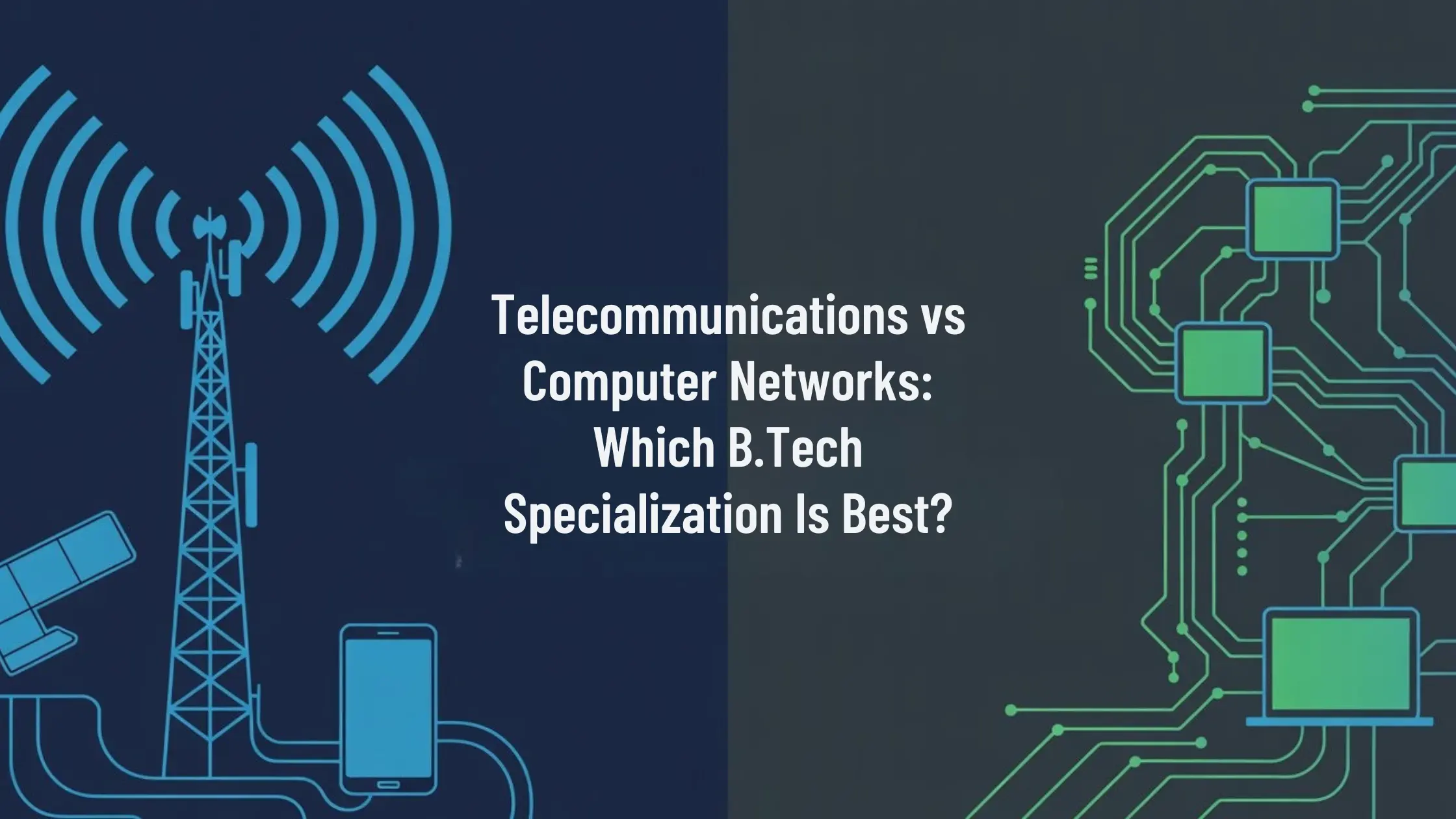Programs
- M. Tech. in Automotive Engineering -Postgraduate
- B. Sc. (Hons.) Biotechnology and Integrated Systems Biology -Undergraduate

As you stand at the crossroads of your B.Tech journey, choosing the right specialisation can be a daunting task. Two fields that often leave students in a quandary are Telecommunications and Computer Networks. While both disciplines fall under the umbrella of Information and Communication Technology (ICT), they differ significantly in their focus, skill requirements, and career prospects.
To make an informed decision, it’s crucial to understand the nuances of each field and assess your interests and aptitudes. This article aims to provide you with a comprehensive comparison between Telecommunications and Computer Networks, helping you navigate this critical juncture in your B.Tech journey.
Amrita University, a premier institution renowned for its excellence in engineering education, offers a dynamic curriculum that equips students with the knowledge and skills necessary to excel in their chosen B.Tech specialisation. With a focus on holistic development and strong industry partnerships, Amrita University is an ideal choice for aspiring engineers.
B.Tech Telecom focuses on the science and engineering behind transmitting information across distances using technologies such as electromagnetic waves, fiber optics, and advanced wireless systems. This specialisation powers everything from mobile networks and broadband to satellite communication and IoT ecosystems.
To excel in Telecommunications, you should have:
Computer Networks B.Tech focuses on the design, implementation, and management of systems that enable computers to exchange data. This field forms the backbone of the internet, intranets, and other data exchange systems, enabling seamless communication and resource sharing.
To thrive in Computer Networks, you should possess:
Telecommunications Careers
Computer Networks Careers
Both Telecommunications and Computer Networks are experiencing significant growth, driven by advancements in technologies such as 5G, IoT, cloud computing, and cybersecurity. Companies like Nokia, Ericsson, Cisco, and Amazon Web Services (AWS) are actively hiring professionals in these fields.
Choosing between Telecommunications and Computer Networks as your B.Tech specialisation requires careful consideration of your interests, aptitude, and career aspirations. While both fields offer exciting opportunities, they cater to different skill sets and problem-solving approaches.
If you are drawn to the physical and engineering aspects of communication systems, Telecommunications might be the ideal choice for you. On the other hand, if you have a penchant for software development and IT infrastructure, Computer Networks could be your calling.
Amrita University, with its dynamic curriculum, experienced faculty, and strong industry partnerships, provides an excellent platform to pursue your chosen B.Tech specialisation. The university’s emphasis on holistic development and practical exposure ensures that you are well-prepared to tackle real-world challenges and seize opportunities in the ever-evolving tech landscape.
Ultimately, the decision lies in your hands. Take the time to introspect, explore the nuances of each field, and align your choice with your long-term goals. Whether you opt for Telecommunications or Computer Networks, remember that both paths offer dynamic and rewarding careers in the interconnected world of technology.
What are the key differences between Telecommunications and Computer Networks?
Telecommunications focuses on the transmission of information over distances using various technologies, while Computer Networks deal with the design, implementation, and management of systems that enable computers to exchange data.
Can I switch between Telecommunications and Computer Networks during my B.Tech program?
While it may be possible to switch specialisations, it is advisable to make an informed decision at the outset to avoid potential challenges in terms of course requirements and credit transfers. Consult with your academic advisor to explore your options.
What are the emerging trends in Telecommunications and Computer Networks?
Telecommunications is witnessing advancements in 5G networks, satellite internet, and IoT, while Computer Networks are experiencing growth in areas like cloud computing, cybersecurity, and software-defined networking (SDN).
How can I assess my aptitude for Telecommunications or Computer Networks?
Evaluate your strengths in subjects like physics, mathematics, programming, and problem-solving. If you enjoy working with hardware and wireless technologies, Telecommunications might be a good fit. If you prefer software development and network programming, Computer Networks could be your forte.
What role does Amrita University play in shaping my career in Telecommunications or Computer Networks?
Amrita University offers a comprehensive curriculum that is regularly updated to align with industry standards. The university’s strong industry partnerships, experienced faculty, and emphasis on holistic development ensure that you acquire the engineering skills necessary to excel in your chosen B.Tech specialisation.